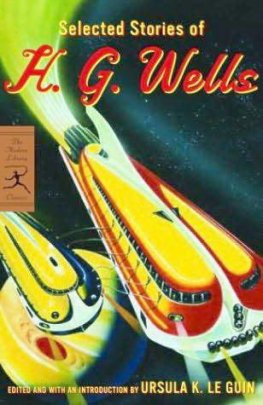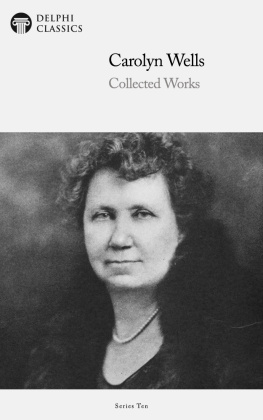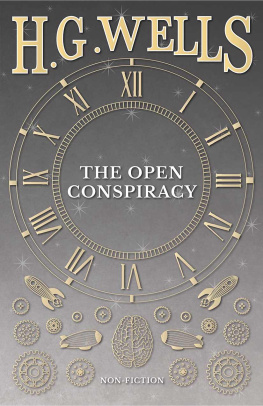ACKNOWLEDGMENTS AND REFERENCES
H. G. WELLSS LIFELONG concern with education was so deeply a part of his work that it sems only appropriate to begin a list of the references upon which I drew in the composition of this biography with a nod in the direction of the five finest teachers I have known. They are: Betsy Rogers, Dr. Eugene Pfaff, Dr. Richard Whitlock, Dr. Jerry Meisner, and Ted Reynolds. I hope that every reader of this book will spend part of his or her education in company with teachers as fine as these. They helped shape my own attitudes toward education and prepared me to appreciate the attitudes held by H. G. Wells.
While H. G. Wells felt frequent call to shout at editors and complain about agents, Ive been much more fortunate. My thanks, then, to Linda Cabasin, a wonderful editor, and to Herb Katz, who first liked this book. And a special nod of appreciation to Henry Morrison.
As far as more scholarly references, there are several:
Experiment in Autobiography (New York: The Macmillan Company, 1934) by Wells himself is the one indispensable source for anyone desiring an account of Wellss life. Lively, opinionated, learned, angry, rude, funnynowhere are the many sides of H. G. Wells better portrayed than in the pages of this book. It is one of the great modern autobiographies and has been too long out of print.
H. G. Wells (New York: Simon and Schuster, 1973) by Norman and Jean MacKenzie is, simply, one of the outstanding literary biographies of recent years. It is well written, exhaustively thorough in research and representation, and places Wells squarely in a tradition of English thinkers and writers. The MacKenzies present a candid and complete biography of H. G. Wells that would be difficult to surpass. H. G. Wells is a model of what biography can and should be.
H. G. Wells: His Turbulent Life and Times (New York: Atheneum, 1969) by Lovatt Dickson is an engaging book that illuminates Wellss professional career. Much of the books emphasis is on Wellss relationships with his publishers, and Dickson offers a fascinating glimpse of Wells as craftsman, artist, businessman, and world figure.
A book that will be helpful to the student seeking to understand Wellss critical reputation is H. G. Wells: The Critical Heritage (London: Routledge & Kegan Paul Ltd., 1972) edited by Patrick Parrinder. This book is a selection of reviews of Wellss work that appeared as his books were published. The reviews are fascinating reading in themselves and offer insights into Wellss changing status in the literary community.
An H. G. Wells Companion (New York: Barnes & Noble, 1979) by J. R. Hammond is a guide with thorough synopses and interpretations of Wellss novels, scientific romances, and short stories. The book contains a glossary to characters, titles, and locations in Wellss fiction.
Finally, there is no better way to understand H. G. Wells than to readfor the first time or the fortiethhis books. They are a monument to one of our greatest writers.
ONE THE PROPER ORDER OR SOCIETY
THE DUSTY CHINA SHOP was named Atlas House, and it rested the burden of its world on the shoulders of Sarah Wells. She did not carry the weight well. Atlas House stood on High Street in Bromley, a London suburb, and its surroundings, contents, and customers drove Sarah into depression, sometimes despair. Everything and everyone on High Street seemed to Sarah either garish or grimy or both. She loathed the street and she loathed her house. Her rightful place was in the lovely estates of the wealthy, working as a trusted employee in the midst of culture, beauty, and grace. Instead, she was trapped in this three-story box, many of whose stairs lacked carpeting, most of whose walls reeked of the paraffin used to battle, unsuccessfully, bugs.
It was 1866 and Sarah had lived in Atlas House for eleven years. She had raised her two boys in this house. And here she had lost her only daughter, Frances, barely two years before. Sarah thought often of Frances, that perfect little girl. Her daughter. Shed taught Frances so much, had given her all the benefits she was able. Frances was only nine when she died, just coming to understand Sarahs explanations of the proper order of society, the order of society in which Sarah and her husband, Joseph, once held and then lost their place.
The proper order of society. That order was a rigid class system, the essence of English life, a living link with history. According to the rules of society, privilege and rank were determined by the class into which one was born. The origins of the class system lay in the Middle Ages, a time when the king was served by his knights, who pledged him their allegiance and skills as warriors. The knights, in turn, held their place above vassals and serfs. Even the vassals and serfs had their own ranks among themselves.
Over the centuries this idea of order in English society remained well established, although its nature changed and evolved. The warrior knight, whose sword was no longer needed to defend the land, became known as a gentleman. These gentlemen retained not only the great tracts of land that had been in their families since medieval times, but also the highest position, other than that of royalty itself, in English society.
Below the gentlemen were those who served them. As England moved from an agricultural to an industrial economy, the class of vassals and serfs gave way to the rising middle class. The majority of the population was no longer needed to work the fields. Industry was drawing more and more people to the cities, where their great hope was of advancement, of getting ahead.
There were strict limits to how far one could advance. A person born into the middle or lower classes could never become a true gentleman or lady. But, as Sarah Wells believed, one could improve ones self within the boundaries of ones own class. This was the great goal of Sarahs life.
Sarah herself had been educated, a rare accomplishment for an innkeepers daughter born in 1823. Sarahs education was neither broad nor deepshe could read and write, and had been exposed to a few other subjectsbut it gave her a sense of confidence and made her feel that she was special. With her talents she was sure she would find her own secure place in societys proper order.
Following a brief apprenticeship to a dressmaker, Sarah found her proper place. She became a ladys maid, working in fine houses, serving those better-born than she. It was a position she enjoyed, took seriously, and felt proud of. She served her mistresses perfectly, and one of them, Miss Fetherstonhaugh, came to think of Sarah as a friend. Sarah took much pleasure from her status, and left service only to care for her ailing mother. Sarahs parents died during the same season in 1853. Before that year was out, before securing another position, Sarah married Joseph Wells, a gardener.
Joseph Wells was a short man, physically strong and attractive. He was well employed as head gardener of a large estate. In addition to being respectable, proper enough for Sarahs idea of things, the job carried a handsome salary and brought with it a pleasant cottage into which the young couple settled. Joseph enjoyed his work: He was a vigorous outdoorsman who derived great satisfaction from making things grow. With such a bright future, Sarah felt very happy and soon was expecting a child.
But while the couple was happy, Josephs employer was not. Joseph did not take well to instructions; he had his own idea of how things should be done. His temper flashed too often. In February 1855 Frances was born. In July Joseph lost his job. For the rest of her life Sarah would seethe with bitterness over this cruel twist of fate.
Unemployed, with prospects bleak, Joseph turned from service to the world of commerce. He applied his meager savings and a small inheritance to the purchase of Atlas House from a cousin. The shop was not a success, despite the strength in its name. Few of its china pieces matched, and even fewer found buyers. There was little money for expanding or improving the inventory. Sarah began her descent into self-pity not long after moving into Atlas House. She felt that her hard-won place in the proper order was lost. She felt that she and Joseph had been cheated by Josephs cousin, and cheated by life itself.










